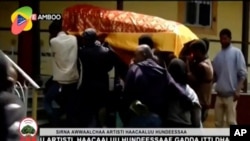At least 80 people have died in protests this week in Ethiopia following the killing of popular singer Hachalu Hundessa. Known for his political songs, Hundessa's death has heightened ethnic tensions in Ethiopia, as the protests spread to the Oromia region, where Hundessa was born. As authorities shut down the internet in parts of the country, analysts say officials need to manage the country’s political system well to avoid unrest.
Security remains tight across Ethiopia a day after the funeral of revered singer and musician Hachalu Hundessa.
His killing this week sparked riots in and around Addis Ababa, leaving at least 80 dead.
Murithi Mutiga is the Horn of Africa project director at the International Crisis Group. He says the anger witnessed in the streets of Ethiopia was not only about the killing of the musician but also the country’s underlying historical grievances by different ethnic groups.
“This whole transition is characterized by very substantial complex tensions and the killing of the young musician was essentially a trigger because of the deep frustrations that some of the protesters still feel," said Mutiga. "This killing has served as a spark and a trigger for substantial unrest as we have witnessed.”
Hundessa was gunned down Monday night in Addis Ababa, a week after he appeared on the Oromia Media Network, where he criticized Ethiopia’s leadership and spoke against the mass incarceration of Oromo youth.
The musician was ethnic Oromo, a group that has a long history of being discriminated against.
Since Prime Minister Abiy Ahmed came to power in 2018, ethnic groups' demands for political, social, and economic inclusion and in some cases, independence have been growing.
When he came to power, Abiy promised his administration would take a different approach to the country’s problems.
Fisseha Tekle, an Ethiopia researcher for rights group Amnesty International, says security forces continue to use force in dealing with demonstrators.
“Our primary findings indicate that security forces were shooting at protesters because they burned tires or they demolished government buildings. That’s the case in Adama, for instance," said Tekle. "There were some instances where there were ethnic clashes. We can see that the behavior of the security forces towards protesters is not in line with human rights standards because they usually use lethal force against protesters.”
Jawar Mohammed, opposition politician Bekele Gerba and 33 others were detained by police in connection with riots over the past week.
Abiy has vowed to restore calm in the country. Police say three people have been arrested in connection with Hundessa’s killing. They gave no details, but the prime minister said the shooting could be tied to the assassination of the chief of the Ethiopian army last year.
Mutiga says the country needs to carry on with its reforms.
“Ethiopia’s transition is very carefully watched. It has been a source of hope for many in Ethiopia and outside the country," said Mutiga. "It's essential that elites don’t fritter all that hope. They need to find a way to talk, they need a way to find a way to solve their differences and bring transition back on track.”
Meanwhile, to limit the spread of the violence, authorities have cut internet and mobile phone service. Officials have also postponed elections that were scheduled for next month until next year.




